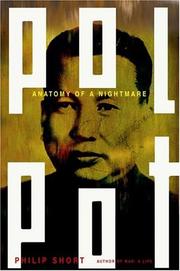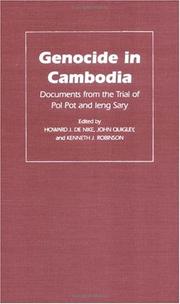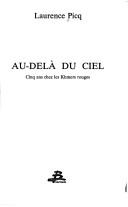| Listing 1 - 10 of 16 | << page >> |
Sort by
|
Book
ISBN: 2330108672 9782760913127 2760913120 9782330108670 Year: 2018 Publisher: Arles: Actes Sud,
Abstract | Keywords | Export | Availability | Bookmark
 Loading...
Loading...Choose an application
- Reference Manager
- EndNote
- RefWorks (Direct export to RefWorks)
"The author took a trip to Cambodia in 2008. This novel is about the Khmer genocide led by the rule of Pol Pot, in 1969 to 1979." "Amorcée dans Bad Girl. Classes de littérature (2014) sous forme d'autobiographie intra-utérine, la trajectoire littéraire de Nancy Huston se poursuit cette fois de 1969 à 1979 : années de formations affective, intellectuelle, sexuelle et politique, aux États-Unis et en France, que la romancière revisite à travers l'écho persistant d'un voyage qu'elle a fait au Cambodge en 2008. Alors attentive aux traces du génocide khmer mené sous la férule de Pol Pot, elle reconstitue ici et croise parfois ces deux lignes de vie qui la font passer, elle, de Dorrit à Mad Girl-Nancy Huston et lui de Saloth Sâr à L'homme nuit-dictateur, dont les atrocités ont à jamais sali l'Histoire."
Genocide --- Écrivaines canadiennes --- Dictateurs --- Pol Pot --- Huston, Nancy, - 1953 --- -Pol Pot --- Cambodia --- France --- Cambodge
Book
ISBN: 3657786929 350678692X Year: 2017 Publisher: Paderborn Brill | Schöningh
Abstract | Keywords | Export | Availability | Bookmark
 Loading...
Loading...Choose an application
- Reference Manager
- EndNote
- RefWorks (Direct export to RefWorks)
»Um eine neue Gesellschaft errichten zu können, müssen neue Menschen erschaffen werden« - so der Slogan der Roten Khmer. Daniel Bultmanns Buch zeichnet die Ursprünge der Bewegung unter Pol Pot, die Maßnahmen zur Umformung des Staates, die Ursachen für die Eskalation der Gewalt und das Nachleben der Kommunistischen Partei Kambodschas nach.Die Revolution der Roten Khmer gilt als eines der brutalsten und radikalsten Staatsverbrechen des 20. Jahrhunderts. Unter ihrer Herrschaft starben zwischen 1975 und 1979 nach Schätzungen etwa zwei Millionen Menschen. Das Ziel war die Umsetzung eines sozialistischen Programms, an dessen Ende ein egalitärer Arbeiter- und Bauernstaat stehen sollte. Die Roten Khmer planten aber nicht nur eine Neuordnung der Gesellschaft, sondern auch die Umformung der intimsten Gedanken und Wünsche ihrer Untertanen. Zwangsarbeit, Indoktrination, Selbstkritikstunden sowie ein System von Sicherheits- und Umerziehungslagern sollten den perfekten Sozialisten hervorbringen. Der Autor legt nach langjähriger Beschäftigung mit der Thematik erstmals eine fundierte Geschichte der Revolution der Roten Khmer vor und zeigt, dass der vermeintliche »Steinzeitkommunismus« auch auf ausgeklügelte und höchst moderne Unterdrückungstechniken zurückgriff.
Genozid --- Gewalt --- Indochinakriege --- Kambodscha --- Kommunismus --- Pol Pot --- Rote Khmer --- Völkermord --- Sozialismus --- Pol Pot. --- Parti communiste du Kampuchea. --- Cambodia --- History
Book
ISBN: 0938691356 Year: 1988 Volume: 33 Publisher: [New Haven, Conn.] : Yale Center for International and Area Studies,
Abstract | Keywords | Export | Availability | Bookmark
 Loading...
Loading...Choose an application
- Reference Manager
- EndNote
- RefWorks (Direct export to RefWorks)
Pol, Pot. --- Cambodia --- Cambodge --- Politics and government --- Sources. --- Politique et gouvernement --- Sources

ISBN: 0805066624 Year: 2005 Publisher: New York (N.Y.) Holt
Abstract | Keywords | Export | Availability | Bookmark
 Loading...
Loading...Choose an application
- Reference Manager
- EndNote
- RefWorks (Direct export to RefWorks)
Genocide --- Political atrocities --- Prime ministers --- Pol Pot. --- Cambodia --- Politics and government
Book

Year: 2000 Publisher: Philadelphia University of Pennsylvania Press
Abstract | Keywords | Export | Availability | Bookmark
 Loading...
Loading...Choose an application
- Reference Manager
- EndNote
- RefWorks (Direct export to RefWorks)
Book
ISBN: 9782234052994 2234052998 Year: 2000 Publisher: Paris: Stock,
Abstract | Keywords | Export | Availability | Bookmark
 Loading...
Loading...Choose an application
- Reference Manager
- EndNote
- RefWorks (Direct export to RefWorks)
Prime ministers - Cambodia - Biography --- Pol Pot --- Cambodia - Politics and government - 20th century --- Pol Porth --- Prime ministers --- Cambodia
Book
ISBN: 9781586487874 1586487876 Year: 2011 Publisher: New York : PublicAffairs,
Abstract | Keywords | Export | Availability | Bookmark
 Loading...
Loading...Choose an application
- Reference Manager
- EndNote
- RefWorks (Direct export to RefWorks)
Nobel Prize winning reporter Joel Brinkley illuminates the country, its people, and the deep historical roots of its modern-day behavior.
Democracy --- Social change --- Démocratie --- Changement social --- Pol, Pot --- Influence. --- Cambodia --- Cambodge --- History --- Politics and government --- Social conditions. --- Histoire --- Politique et gouvernement --- Conditions sociales
Book
Year: 1988 Publisher: Phnom Penh : Maison d'édition en langues étrangères,
Abstract | Keywords | Export | Availability | Bookmark
 Loading...
Loading...Choose an application
- Reference Manager
- EndNote
- RefWorks (Direct export to RefWorks)
Trials (Genocide) --- Procès (Génocide) --- Pol, Pot --- Ieng Sary --- Trials, litigation, etc. --- Cambodia --- Cambodge --- History --- Sources. --- Histoire --- Sources --- ʻ`Ieng, Sary


ISBN: 1283212382 9786613212382 0812205464 0812235398 Year: 2000 Publisher: University of Pennsylvania Press
Abstract | Keywords | Export | Availability | Bookmark
 Loading...
Loading...Choose an application
- Reference Manager
- EndNote
- RefWorks (Direct export to RefWorks)
The Khmer Rouge held power in Cambodia from 1975 to 1979 and aggressively pursued a policy of radical social reform that resulted in the deaths of hundreds of thousands of Cambodians through mass executions and physical privation. In January 1979, the government was overthrown by former Khmer Rouge functionaries, with substantial backing from the army of Vietnam. In August of that year a special court, the People's Revolutionary Tribunal, was constituted to try two of the Khmer Rouge government's most powerful leaders, Pol Pot and Ieng Sary. The charge against them was genocide as it was defined in the United Nation's genocide convention of 1948. At the time, both men were in the Cambodian jungle leading the Khmer Rouge in a struggle to regain power; they were, therefore, tried in absentia.Genocide in Cambodia assembles documents from this historic trial and contains extensive reports from the People's Revolutionary Tribunal. The book opens with essays that discuss the nature of the primary documents, and places the trial in its historical, legal, and political context. The documents are divided into three parts: those relating to the establishment of the tribunal; those used as evidence, including statements of witnesses, investigative reports of mass grave sites, expert opinions on the social and cultural impact of the actions of Pol Pot and Ieng Sary, and accounts from the foreign press; and finally the record of the trial, beginning with the prosecutor's indictment and ending with the concluding speeches by the attorneys for the defense and prosecution.The trial of Pol Pot and Ieng Sary was the world's first genocide trial based on United Nations's policy as well as the first trial of a head of government on a human rights-related charge. This documentary record is significant for the history of Cambodia, and it will be of the highest importance as well to the international legal and human rights communities.
Trials (Genocide) --- Genocide --- War crime trials --- Pol Pot --- Ieng Sary --- Iêng Xa-ry --- Kim Trang --- Po-erh-pu-tʻe --- Bo'erbute --- Pot, Pol --- Pôn Pốt --- Saloth Sar --- Pʺul Bat --- Pʺul, Bat --- Bat, Pʺul --- Phō̜n Phot --- Phot, Phō̜n --- Pôn, Pốt --- Saloth, Sar --- Phō̜n, Phot --- Pol, Pot --- European History. --- Human Rights. --- Law. --- Political Science. --- World History.

ISBN: 2736000145 9782736000141 Year: 1984 Publisher: Paris: Barrault,
Abstract | Keywords | Export | Availability | Bookmark
 Loading...
Loading...Choose an application
- Reference Manager
- EndNote
- RefWorks (Direct export to RefWorks)
Pol Pot --- Cambosia --- History --- S31/0120 --- 840-94 PICQ, LAURENCE --- 959.6 "1975/1980" --- #SML: Euntes --- Indo China and South East Asia--Cambodia, Angkorvat --- Picq, Laurence --- -Pol Pot --- Po-erh-pu-tʻe --- Pot, Pol --- Pôn Pốt --- Saloth Sar --- Pʺul Bat --- Pʺul, Bat --- Bat, Pʺul --- Phō̜n Phot --- Phot, Phō̜n --- Ḷurʺáṅ Bic --- Journeys --- -Cambodia --- Description and travel. --- -Description and travel --- Rode Khmer. --- Pol Pot. --- Travel --- Cambodia --- -Description and travel. --- -S31/0120 --- Political philosophy. Social philosophy --- Bo'erbute --- Description and travel --- Pôn, Pốt --- Saloth, Sar --- Phō̜n, Phot --- Cambosia - History - 1975 --- -840-94 PICQ, LAURENCE --- Book --- Communism --- Experiences
| Listing 1 - 10 of 16 | << page >> |
Sort by
|

 Search
Search Feedback
Feedback About UniCat
About UniCat  Help
Help News
News